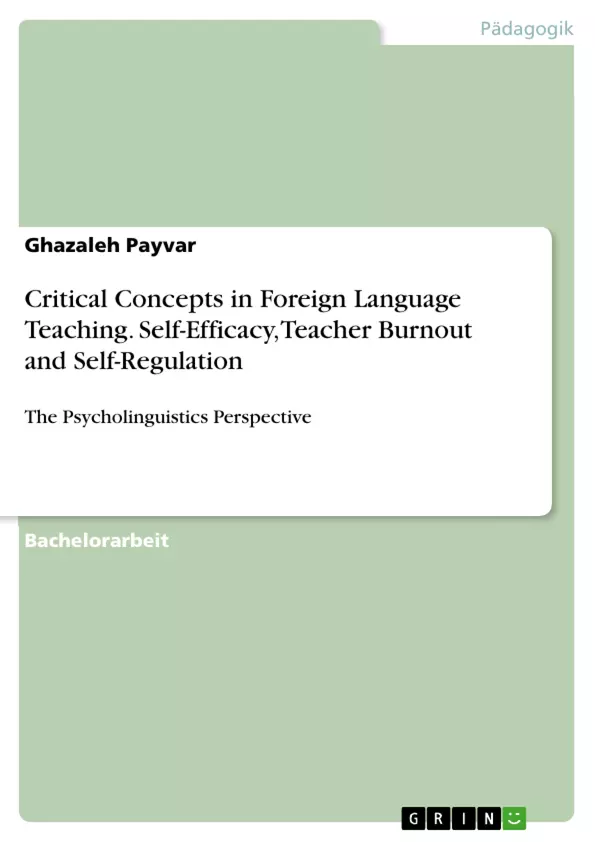This thesis will examine several critical concepts in foreign language teaching from the psycholinguistic perspective. Among the topics discussed are effective teaching and self-efficacy, teacher burnout and self-regulation as well as attitude and motivation.
Language teaching has been subjected to tremendous changes. The history of foreign language (FL) teaching can be traced back to different teaching methodologies. As learning is a lifelong process and it often takes place in a social context and it is also a highly individualized process, theories on language learning and teaching have changed and developed over many centuries and years and evolved from the fields of psychology, cognitive psychology, and linguistics which focusing on these fields.
Whether one agrees with all previous language learning and teaching theories as a FL methodology or not, the important implication in a course of English as FL is that students learn and acquire language without even being aware of the existence of some more crucial elements rather than learning theories. As studying different language and teaching theories and methodologies in line with linguistic knowledge are necessary to become a language teacher, other factors such as teachers’ qualifications has a great direct and indirect impact on students’ learning process.
In other words, as teachers may apply the different theories of learning and teaching methodologies, they need to keep awareness that language teachers have key roles in all teaching methods and generally in teaching and learning process. Teaching is a complex process and is cognitively and emotionally demanding. A qualified language teacher attempts to enrich their linguistic knowledge, cognitive, affective and emotional dispositions to take better actions in response to the demands of their external world like class, students and teaching process.
Inhaltsverzeichnis
- Introduction
- CHAPTER I: Effective Teaching & Self-Efficacy
- 1.1. Characteristics of EFL teachers
- 1.2 Effective language teacher
- 1.3 Self-Efficacy
- 1.3.1 Concept of self-efficacy
- 1.3.2 Role of self-efficacy
- 1.3.4. Structure of self-efficacy
- 1.3.5 Teacher's self-efficacy
- 1.3.6 Empirical Findings on teacher's self-efficacy
- CHAPTER II: Teacher Burnout
- 2.1. Emotional Exhaustion
- 2.2 Cynicism/Depersonalization
- 2.3. Inefficacy/Reduced Personal Accomplishment
- 2.4. The Psychological Features of Burnout in Teaching Profession
- 2.5 Teacher Burnout and Its Relationship to Teacher Self-Efficacy
- CHAPTER III: Self-Regulation
- 3.1 Self-regulation Theory
- 3.2 Phases of Self-regulation
- 3.2.1 Self-regulative Strategies
- 3.2.2 Self-regulated Learning
- 3.3. Self-regulated Teachers
- 3.4 Self-regulation in EFL Context
- CHAPTER IV: Attitude & Motivation
- 4.1 Attitude and Language Learning
- 4.2. Motivation and Language Learning
- 4.2.1 Types of Motivation
- References
Zielsetzung und Themenschwerpunkte
Diese Arbeit befasst sich mit zentralen Konzepten im Fremdsprachenunterricht aus der Sicht der Psycholinguistik. Sie analysiert die Rolle von Selbstwirksamkeit, Burnout und Selbstregulation im Kontext des Fremdsprachenlernens und untersucht, wie diese Faktoren den Lernerfolg beeinflussen. Darüber hinaus beleuchtet die Arbeit die Bedeutung von Einstellungen und Motivationen im Fremdsprachenunterricht.
- Selbstwirksamkeit von Lehrkräften
- Burnout im Lehrerberuf
- Selbstregulation im Fremdsprachenunterricht
- Einstellungen und Motivationen im Fremdsprachenlernen
- Psycholinguistische Perspektiven auf Fremdsprachenunterricht
Zusammenfassung der Kapitel
Das erste Kapitel beleuchtet die Eigenschaften effektiver Lehrkräfte im Englischunterricht. Es untersucht das Konzept der Selbstwirksamkeit und deren Rolle im Bildungsprozess. Das zweite Kapitel widmet sich dem Thema Lehrer-Burnout und untersucht die damit verbundenen Faktoren wie emotionale Erschöpfung und Zynismus. Das dritte Kapitel befasst sich mit dem Konzept der Selbstregulation, wobei die Theorie der Selbstregulation und die verschiedenen Phasen sowie Strategien der Selbstregulation im Detail erläutert werden.
Im vierten Kapitel werden die Bedeutung von Einstellungen und Motivationen im Fremdsprachenlernen hervorgehoben. Unterschiedliche Motivationstypen und ihre Auswirkungen auf den Lernerfolg werden analysiert.
Schlüsselwörter
Fremdsprachenunterricht, Psycholinguistik, Selbstwirksamkeit, Lehrer-Burnout, Selbstregulation, Einstellungen, Motivation, EFL (English as a Foreign Language).
Häufig gestellte Fragen
Was versteht man unter Selbstwirksamkeit (Self-Efficacy) bei Lehrkräften?
Es ist der Glaube einer Lehrkraft an die eigene Fähigkeit, den Lernprozess der Schüler erfolgreich zu beeinflussen, auch unter schwierigen Bedingungen.
Wie hängen Lehrer-Burnout und Selbstwirksamkeit zusammen?
Eine hohe Selbstwirksamkeit kann als Schutzfaktor gegen Burnout wirken, während geringe Selbstwirksamkeit oft mit emotionaler Erschöpfung und Zynismus einhergeht.
Was ist Selbstregulation im Fremdsprachenunterricht?
Selbstregulation umfasst Strategien, mit denen Lernende und Lehrende ihren eigenen Lern- bzw. Lehrprozess aktiv steuern, überwachen und anpassen.
Welche Rolle spielen Motivation und Einstellung beim Sprachenlernen?
Sie sind entscheidende psycholinguistische Faktoren, die bestimmen, wie intensiv und erfolgreich sich ein Schüler mit der Fremdsprache auseinandersetzt.
Was sind die drei Hauptkomponenten von Burnout nach dem Text?
Die Arbeit nennt emotionale Erschöpfung, Zynismus (Depersonalisierung) und reduzierte persönliche Leistungsfähigkeit.
- Quote paper
- Ghazaleh Payvar (Author), 2017, Critical Concepts in Foreign Language Teaching. Self-Efficacy, Teacher Burnout and Self-Regulation, Munich, GRIN Verlag, https://www.grin.com/document/367105



